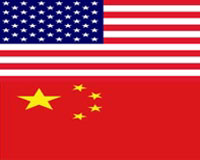| . |  |
. |
Beijing (AFP) Feb 1, 2010 Aerospace giant Boeing said Monday it had not been notified of any sanctions imposed by China in retaliation for a major US arms sale to Taiwan. Beijing said Saturday it would suspend military and security contacts with Washington, and threatened to impose sanctions on US firms involved in the deal. Through its McDonnell Douglas unit, Boeing is one of the companies. "We have yet to receive any notice" related to possible sanctions, Boeing China spokesman Wang Yukui told AFP, adding that China was a "very important" market for the plane maker. China is Boeing's biggest international market, and the company is working hard to grab the lion's share of the booming demand it expects in coming years from Chinese airlines. Boeing's McDonnell Douglas is selling Harpoon missiles to Taiwan as part of the 6.4-billion-dollar arms sale announced by the Pentagon on Friday. Lockheed Martin is providing Patriot anti-missile batteries, and United Technologies unit Sikorsky Aircraft is supplying Black Hawk helicopters. Cai Yan, an official in Sikorsky's marketing department in Shanghai, said she was "unaware of the situation". Taiwan split from the mainland at the end of China's civil war in 1949, but Beijing views the island as part of its territory awaiting reunification. China has hundreds of missiles targeting Taiwan.
US firms reticent on China's Taiwan threat China said Saturday it would punish the companies involved in the arms sales which the Pentagon announced for Taiwan, which China considers part of its territory awaiting reunification. Spokesmen for the Boeing Co., Lockheed Martin Corp. and Raytheon Co. all declined comment on China's announcement, saying it was a matter for governments. "The sale of Patriot air and missile defense systems is between the governments of the US and Taiwan, conducted under the Foreign Military Sales program," Raytheon spokesman Jonathan D. Kasle said. An official at another US company noted that China did not reveal details about the sanctions, making it difficult to gauge the impact. Raytheon and Lockheed Martin were awarded a 2.81 billion dollar contract as part of the deal to produce the Patriot system, which is meant to defend against incoming missiles. Neither defense company has major operations in China, which has been under a US and EU arms embargo since its bloody 1989 crackdown on pro-democracy protesters in Tiananmen Square. But Boeing -- whose McDonnell Douglas unit was given a 37 million-dollar contract for 12 Harpoon missiles to Taiwan -- is an aerospace giant which counts China as one of its largest markets. Nonetheless, Boeing shares were up 1.49 percent at 61.50 halfway through the trading day on the New York Stock Exchange, outpacing the benchmark Dow index's 0.79 rise. Boeing has deep ties with the aviation industry in China, which could stand to lose if it sanctioned the aviation giant. Three Chinese companies are under contract to produce key parts of Boeing's emblematic 787 Dreamliner, which took to the skies in December after a more than two-year delay. The US firms got backing from the White House on Monday, which warned any Chinese sanctions on US firms in retaliation for the arms sale would not be warranted. The White House stressed it wanted a relationship with China in which disagreements could be voiced "out in the open." Asked about a Chinese threat to sanction US firms involved in the sale, spokesman Robert Gibbs said : "I think our reaction to that would not be warranted." Walter Lohman, director of the Asian Studies Center at the Heritage Foundation, a conservative Washington think-tank, said that the sanctions threats came from Chinese officials involved in diplomacy, not the economy. "It's really too early to tell, but I think it's just a bit of noise," Lohman said of the sanctions threats. "I'm sure that companies have all calculated their risks" in China before seeking arms contracts in Taiwan, he said.
Share This Article With Planet Earth
Related Links Global Trade News
 China's procurement policy deepens strains: US experts
China's procurement policy deepens strains: US expertsWashington (AFP) Jan 29, 2010 The United States' economic relations with China are headed into the rocks, with Beijing's new government procurement policy delivering a major blow, US experts said Friday. "I think we're going to see the bilateral economic relations with the Chinese deteriorate over the next year or so," said Bill Reinsch, president of the National Foreign Trade Council. The increasingly strained relat ... read more |
|
| The content herein, unless otherwise known to be public domain, are Copyright 1995-2010 - SpaceDaily. AFP and UPI Wire Stories are copyright Agence France-Presse and United Press International. ESA Portal Reports are copyright European Space Agency. All NASA sourced material is public domain. Additional copyrights may apply in whole or part to other bona fide parties. Advertising does not imply endorsement,agreement or approval of any opinions, statements or information provided by SpaceDaily on any Web page published or hosted by SpaceDaily. Privacy Statement |